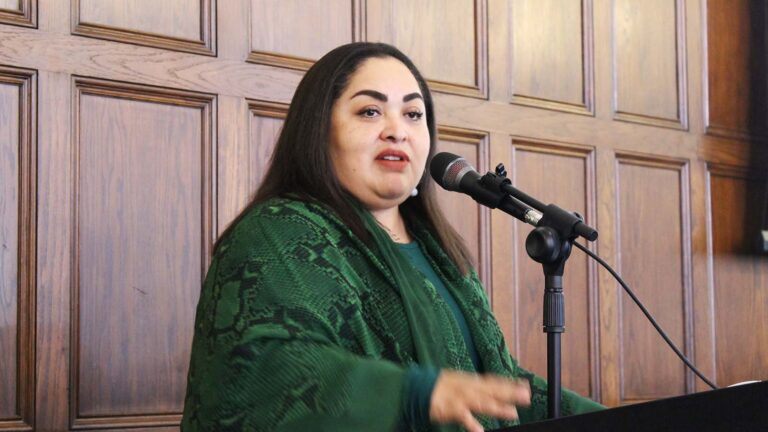CHAMPAIGN — In the weeks before President-elect Donald Trump returns to the White House, Reyna Torres Mendivil is encouraging Mexican-Americans to become citizens if they can.
Torres leads Mexico’s consulate in Chicago. The office provides passports, birth certificates, and legal aid for Mexicans in Illinois and northern Indiana.
“When times are uncertain, like the times we’re getting into, the only way in which you are going to be fully protected is if you’re a citizen. So if you’re eligible, this is the time,” Torres said.
Trump has promised to conduct mass deportations after he is inaugurated. According to the Pew Research Center, there are about 37 million Mexican-Americans. About one in three were born outside of the United States, and about four million are undocumented.
IPM’s Emily Hays spoke with Torres about how she’s preparing for changes in immigration policy under Trump.
HAYS: One of the promises the incoming president has campaigned on is mass deportations as soon as he comes into office. How are you feeling about that?
TORRES: Geography has determined we need to have an open conversation with whoever is in the White House and also with the 50 states in the US. That’s part of our duty. That’s why Mexico has this large consular footprint in the US. So we are willing and open to have productive, constructive conversations with any government. However, of course, we are concerned about certain elements of that narrative that were in President Trump’s previous administration, and we are preparing ourselves.
HAYS: What would you encourage immigrant families to do right now?
TORRES: They need to be informed. This is one of the most important things with the impact of social media right now. The grandparents and parents may not be following TikTok, but the kids are doing that, and they are seeing all sorts of crazy things on X or TikTok or Facebook. Get your information from official sources. Go to the organizations. Go to the consulate, the Mexican consulate, in this case, or any other consulate that puts out information, and be aware of fraud. Be aware of people that are trying to take advantage of this situation of vulnerability. Some people may say, ‘Give me X amount of money and I will get papers for you,’ which is the common term they use. Be aware of those. The situation is complex. If you’re going to get legal advice, make sure that you are getting the advice from somebody that is authorized to give it. Do not believe what you see out there. What has happened in the past is there is a rumor in Facebook that there is going to be a raid in this place or the other place, and that only increases the stress on the kids and the families. That’s one of the very negative consequences.
HAYS: What did you do during the last Trump administration related to deportations and protecting Mexican citizens and Mexican diaspora members?
TORRES: We increased our operations — a lot of “Know Your Rights” worships. A lot of “how to be prepared to be back in Mexico” workshops, to explain to people that may not be familiar with Mexican current political circumstances. These are the institutions that are in place in Mexico that can help you once you’re there. These are the different telephone numbers, or public offices or organizations that could give you a hand once you find yourself or your family back in Mexico without knowing anybody if you don’t have that family support. For many people that have been here for decades, that’s going to be the case. Our authorities in Mexico are already working with academic institutions to make sure if you’re here in the university, and you are removed and you’re back in Mexico, you can continue your education. So the world is not going to end. That’s the feeling that I want to pass on to our community. If you are back in Mexico, it’s going to be difficult, of course, nobody wants that. People have been here for decades, contributing to the economy of this country. They also have a right. But if for any circumstances, you find yourself back in Mexico, we want to make sure that you find the support there as well.
This conversation has been edited for clarity and conciseness.

